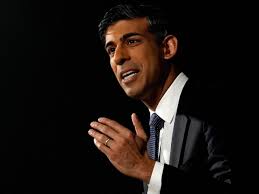Martin Kettle
Political prediction is a mug’s game. Wise commentators should try to refrain from too many of them. Yet it is hard to look at Rishi Sunak’s government right now and not offer one. Here’s mine. Amid the government’s current struggles, a culture war campaign against liberal institutions is increasingly likely to be the centrepiece of the Conservative general election effort next year. For convenience, call it Enemies of the People 2.
It was not intended to be like this when Sunak took over. When he first set out his five priority targets, the goals by which he invited the public to judge his government when election day came, they appeared quite sensibly chosen, mostly modest, perhaps at least partially achievable and a welcome contrast from the gassy bombast of Boris Johnson and the delusional dogmas of Liz Truss. Very little of that is still true now, a mere six months on. Instead, when Sunak was questioned by select committee chairs at Westminster this week, he made no real attempt to pretend he is on course to reach any of the targets at all. Instead, the best the prime minister could offer was that he was “throwing everything at it” and “working 100%”.
The retreat into caution is hardly surprising. The commitment to halve inflation is not going well – the UK is the only G7 country where inflation is still rising. Nor is the pledge to grow the economy – still on the threshold of recession. The promise to reduce the public debt is doing no better. Meanwhile, in the week of the NHS’s 75th anniversary, the claim that people would get the care they need more quickly seems to have been overtaken by imploding Tory confidence in the universal service itself. And Labour continues to have a commanding lead in the opinion polls. Which leaves the final pledge of stopping the boats. That isn’t going well either. There was a large surge of attempted Channel crossings in June. The main summer peak is probably still to come, driving the total above the 2022 record of more than 40,000 people. But in the absence of any sustained turnaround in the cost of living crisis or any material improvement in the macro-economy more generally, the Conservative election offer is defaulting to a more rhetorical performative approach, to which a confrontation over migration is central. This is tricky stuff for a leader such as Sunak, who aims to be judged on technical competence, grasp of detail and practical achievement rather than any claim to possess the common touch. But the decline in confidence about Sunak is palpable. It showed up this week in his poor ratings in the ConservativeHome popularity surveys. It is there, too, in the shifting centre of gravity towards more performative campaigning on the Brexit model.
The former home secretary Priti Patel’s Rwanda deportation policy, now fully embraced by her successor, Suella Braverman, in her illegal migration bill, has become the embodiment of this approach. The animating spirits are cruelty and a readiness to provoke. The policy does this by being deliberately isolationist, spurning international norms and structures, and by setting itself against the idea of universal rights as they have evolved in the postwar era. It also picks fights with institutions such as the church and the courts. It offends the case for compassion to strangers made by the archbishop of Canterbury, Justin Welby, when the bill reached the House of Lords in May. Welby’s important and sensible amendment requiring a more long-term and more globally coordinated approach was being debated on Wednesday. Above all, though, the bill is designed to provoke a confrontation with the judges, and through them with the rule of law, in part because of the burgeoning disrespect for lawyers running through the modern Tory party and in part in the hope that Labour will somehow be drawn in and outmanoeuvred.
Braverman’s response to the appeal court’s two-to-one finding against the Rwanda policy last week exemplified this. Her statement to MPs was condescending – “a disappointing judgment”. It cast the issue in unequivocally populist and partisan terms. “Today,” she said, “is a bad day for the British people. Today is a good day for the people smugglers. It is a good day for Labour.” This may be only a taster if the supreme court makes a similar finding – though such a ruling against the policy is far from certain. Ministers have not forgiven the highest court in the land for the prorogation ruling in 2019. They would like to clip its wings. They want to return to the unfinished business of curbing judicial review. Many still want to withdraw from the European convention on human rights and to scrap the Human Rights Act. They hope that, under Lord Reed, the court is less willing to confront the executive than it was under his predecessor, Lady Hale, four years ago. A lot therefore hangs on the way the supreme court jumps on the Rwanda policy. Some ministers think this is a win-win situation. If the court reverses the appeal court’s ruling, deportations to Rwanda can begin, just in time for the election – though in truth there will be nothing approaching the “tens of thousands” of deportations that Johnson airily predicted in 2022.
If the court upholds the appeal court, though, denunciations of the judiciary will again be in order by ministers and the press, just as they were in 2016 over the Brexit process, when the Daily Mail first used the “enemies of the people” headline and Truss, then lord chancellor, went out of her way not to stand up for the judges’ independence. Senior judges are extremely well aware of how much is likely to be at stake this time, and worried about the likelihood of the courts being in the crossfire. But they are also aware that Britain has treaty obligations and that migrants have rights. Either way, though, the performative political style is now the comfort zone for significant sections of Sunak’s party. Only this week, the so-called New Conservatives, a group of about 25 Conservative MPs from the 2017 and 2019 intakes, issued a plan to cut migration by more than 360,000 in the next 12 months. Even if this was a desirable goal, it is clearly an unachievable one. But, as the Brexit campaign showed so powerfully, it is sometimes the emotive effect of the policy that counts, not its workability or its good sense. It is one of the tragic lessons of the politics of the past decade. Braverman’s bill is not designed to work or to create a smoothly efficient system, let alone to be consistent with Britain’s postwar commitment to humane and just treatment of refugees within international models. The otherwise jaw-dropping cost of the measures in taxpayers’ money – £169,000 a head if the migrants end up being sent to Rwanda – is entirely secondary to their theatricality. The purpose is nationally demeaning – to roll the pitch for a needless cultural confrontation that will do nothing to rescue the government and can only weaken the country at home and abroad.
The Guardian







